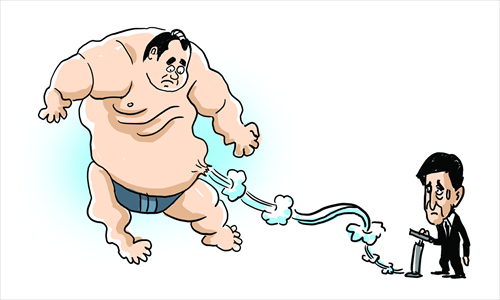Abenomics’ fate depends on China trade

Illustration: Liu Rui/GT
This Thursday, which marks the 68th anniversary of Japan's surrender in WWII, will be a big test for Sino-Japanese ties. Disagreements over history and island disputes may push the Sino-Japanese relationship to the lowest point in a decade.
Japanese cabinet member Tomomi Inada and the ruling Liberal Democratic Party's (LDP) policy chief Sanae Takaichi have announced plans to visit the controversial Yasukuni Shrine on Thursday.
Prime Minister Shinzo Abe has ruled out the possibility that he will visit the shrine on this sensitive day. But Abe's staying away from the shrine for now does not mean he has shifted away from his right-wing stance.
Abe and other Japanese hawkish politicians' remarks on the war and the Peace Constitution, combined with the recent debut of Japan's biggest warship since WWII, have not only strained Japan's ties with its two important Asian neighbors, but also raised eyebrows in the US.
Abe, if he eats his own words and visits the shrine, will not only irritate his two Asian neighbors further, but also alarm the US about the country's ambitions to revise the international order arranged after WWII, which may eventually cause more frictions between Japan and its "big brother," the US.
Though his cabinet member and LDP official's visits will be widely denounced, the damage on Japan's diplomacy will be relatively smaller. Meanwhile, the visits can demonstrate that his cabinet and the LDP will not yield to outside pressure.
Currently, there is no way to solve the standoff between China and Japan, since neither plans to compromise on the island dispute, especially Japan's "nationalization" has even blocked the way back to the original agreement to "shelve the dispute and jointly exploit the islands."
After the July upper house election victory, Abe reiterated his willingness for rapprochement with China, and the Chinese Ministry of Foreign Affairs responded by emphasizing that actions speak louder than words.
However, Abe may truly want to improve ties with China, but only for the sake of bilateral trade and Japan's economy. He has said that the conflicts between the second and third largest world economies may deal a heavy blow to the global economy.
In 2012, Sino-Japanese trade reached $329 billion, a decrease of 3.9 percent year-on-year. And Japan's exports to China shrank by 8.6 percent compared with 2011.
In the first half of this year, bilateral trade dropped by another 9.3 percent. And China's export to Japan dropped by 3.8 percent in this period, while imports from Japan slumped by 13.8 percent.
Currently, Sino-Japanese trade accounts for 9 percent of China's total trade, but 21 percent of Japan's total. If the standoff continues, it seems that Japan will suffer more than China.
Abenomics, which targets 2 percent economic growth, won more than 70 percent support from voters before the July election.
The first two arrows in Abenomics' quiver, an ultra-loose monetary policy and an increase in government spending, have more or less propped up Japan's economy in the short term.
However, Abe's third arrow of structural reform is only a vague idea. If Abenomics fails in boosting productivity, encouraging women back to work, easing the burden of enterprises or raising household income, the first two arrows' impact will gradually fade by 2014.
To maintain momentum, Japan's economy has to expand its exports. And China, Japan's largest trade partner, will be essential for Japan's economic growth.
The hawkish Abe is also a practical politician. In 2006, when he became Japanese prime minister for the first time, he managed to thaw ties with China that were at freezing point because of his predecessor Junichiro Koizumi's Yasukuni Shrine visits.
That year the Japanese economy's share of the world's total dropped to the lowest since its recession in the 1990s.
It's not an exaggeration that the future of Sino-Japanese ties lies in Abenomics. If Abenomics is not able to carry out sweeping reforms, Abe may be more eager to improve ties with China, or he will simply lose his post, just as he failed in implementing structural reforms in 2007.
The author is an independent observer in international politics. opinion@globaltimes.com.cn